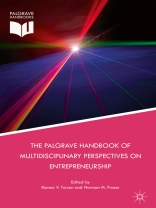Departing from the traditional approach of surveying current and future trends and developments, this unique Handbook brings phenomena, theories, and concepts from multiple disciplines together to advance entrepreneurship. With original contributions from authors who are experts in their fields, the collection offers state-of-the-art insights into generating new areas for research, new theories and concepts, and new questions for policy debates – all aimed at advancing entrepreneurship. Divided into four sections and covering perspectives such as neuroscience, theology, organisational behavior and education, The Palgrave Handbook of Multidisciplinary Perspectives on Entrepreneurship is a rich source of information for researchers, educators, entrepreneurs, leaders and managers.
İçerik tablosu
Part I. Introduction.- 1. Multidisciplinary Perspectives on Entrepreneurship; Norman M. Fraser and Romeo V. Turcan.- Part II. Micro Level.- 2. Psychological Perspective on Entrepreneurship; Annemarie Østergaard, Susana C. Santos and Sílvia Fernandes Costa.- 3. Cognitive Neuroscience Perspective on Entrepreneurship; Jeanne Sørensen Bentzen.- 4. Framing Perspective on Entrepreneurship; Ade Mabogunje, Poul Kyvsgaard Hansen and Pekka Berg.- 5. Creativity Perspective on Entrepreneurship; Chaoying Tang, Christian Byrge and Jizhong Zhou.- Part III. Meso Level.- 6. Business Model Perspective on Entrepreneurship; Morten Lund and Christian Nielsen.- 7. Organizational Perspective on Entrepreneurship; Pamela Nowell and Bram Timmermans.- 8. Family Perspective on Entrepreneurship; Allan Discua Cruz and Rodrigo Basco.- 9.Technology Development Perspective on Entrepreneurship; Poul Kyvsgaard Hansen and Ole Madsen.- 10. Process Perspective on Entrepreneurship; Frank Gertsen, Astrid H. Lassen, Louise Møller Haase and Suna L. Nielsen.- 11. Exit Perspective on Entrepreneurship; Kristian Nielsen and Saras Sarasvathy.- Part IV. Macro Level.- 12. National System Perspective on Entrepreneurship; Jesper Lindgaard Christensen.- 13. Business Systems Perspective on Entrepreneurship; Mohammad B. Rana and Matthew M. C. Allen.- 14. Education Policy Perspective on Entrepreneurship; John Reilly.- 15. International Law Perspective on Entrepreneurship; Alex Fomcenco and Sebastiano Garufi.- 16. Transmedia Perspective on Entrepreneurship; Nikhilesh Dholakia, Ian Reyes, Finola Kerrigan.- 17. Migration Perspective on Entrepreneurship; Maria Elo and Per Servais.- 18. Ecosystems Perspective on Entrepreneurship; Petri Ahokangas, Håkan Boter and Marika Iivari.- Part V. Meta Level.- 19. Human Systems Perspective on Entrepreneurship; Barrett W. Horne.- 20. Sociology of Knowledge Perspective on Entrepreneurship; Romeo V. Turcan.- 21. Ethics Perspective on Entrepreneurship; Ann Starbæk Bager, Marita Svane and Kenneth Mølbjerg Jørgensen.- 22. Theological Perspective on Entrepreneurship; Kristin Falck Saghaug and George Pattison.- 23. Philosophical Perspective on Entrepreneurship; Michael Fast.
Yazar hakkında
Romeo V. Turcan is Professor in the Department of Business and Management at Aalborg University, Denmark. His main research interests relate to cross-disciplinary theory building, legitimation of new sectors and new ventures, international entrepreneurship, de-internationalisation and late globalisation. Romeo founded the Theory Building Research Programme at Alborg University and has business experience in NGO, power, oil, military high-tech and management consulting sectors.
Norman M. Fraser is Adjunct Professor in the Department of Business and Management at Aalborg University, Denmark. Norman is an entrepreneur with 25 years of experience in starting and running international technology businesses, including Vocalis Group plc, Endava Ltd and Soft Iron Ltd. Prior to that, he held research posts at University College London and the University of Surrey, UK, investigating the interfaces of human communication and computer systems. During this time, Norman co-founded a world-renowned linguistics research centre dedicated to the study of language diversity and its theoretical consequences.












